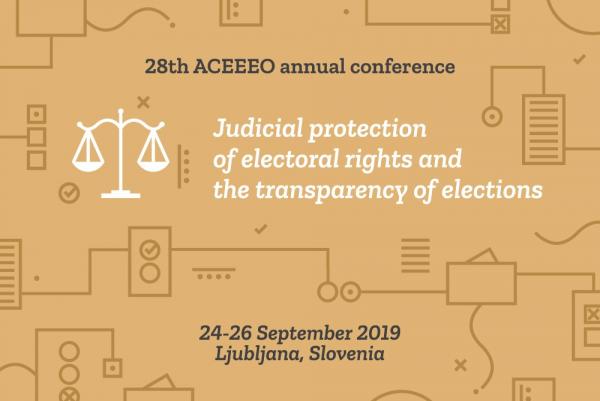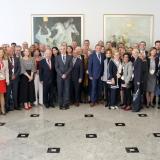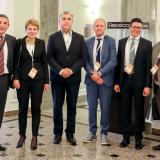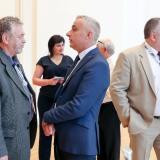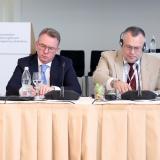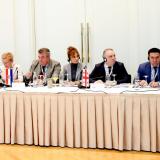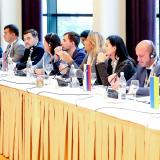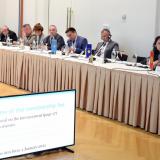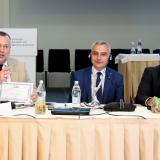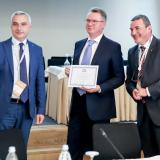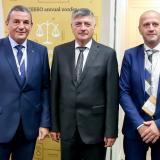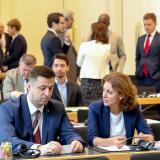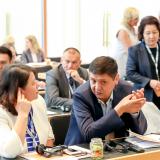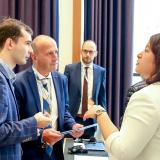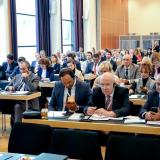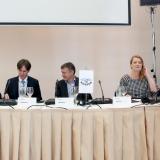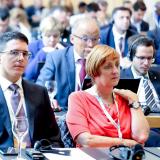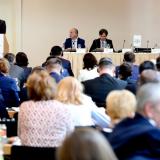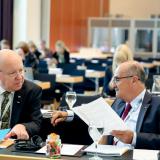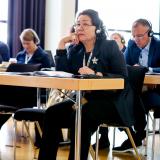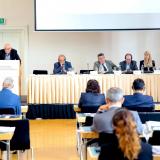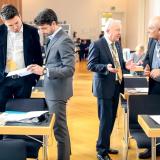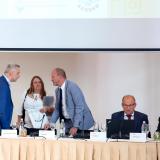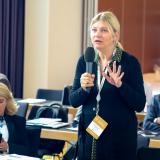28th Annual Conference and General Assembly meeting of the ACEEEO
Date: 24-26 September 2019, Ljubljana, Slovenia
Topic: Judicial protection of electoral rights and the transparency of elections
The annual conference focuses on the following issues of protection of electoral rights:
- best practices of the EMBs' dialogue with other stakeholders;
- most effective ways of the cooperation between the EMBs and the courts;
- practical aspects of transparency of elections from the perspective of the EMBs.
Live stream from Day 1:
Live stream from Day 2:
Organizers
State Election Commission of Slovenia
The State Election Commission is a permanent state body responsible for organizing and conducting elections and referendums. The State Election Commission is composed of: the Chairman, Deputy Chairman, 5 Members and 5 Deputy Members. The Chairman of the State Election Commission and his Deputy are appointed from among the judges of the Supreme Court. Two Members and two Deputy Members of the State Election Commission are appointed from among the legal experts. Remaining three Members and their Deputies are appointed on the basis of the proposals made by political parties, taking into account the proportional representation of political parties.
As the highest electoral authority, the State Election Commission performs tasks provided by the National Assembly Elections Act and other acts concerning electoral legislation. Within the scope of its tasks, the State Election Commission in particular:
- works to ensure the legality of elections and the uniform application of electoral laws relating to the electoral process;
- appoints Members of Electoral Commissions in constituencies and Local Electoral Commissions;
- coordinates the work of Electoral Commissions in constituencies and Local Electoral Commissions, and provides technical instructions concerning the implementation of electoral legislation, and supervises their work;
- prescribes forms for the implementation of electoral laws;
- sets uniform standards for election materials and determines other material conditions for carrying out election tasks;
- publishes the outcome of elections;
- issues confirmations of election;
- ensures ballots are held at diplomatic and consular representative offices of the Republic of Slovenia;
- organises training for members of other electoral bodies;
- appoints the Director of the Office of the Commission.
The State Election Commission has its own service department or Office. The Office of the State Election Commission performs professional, administrative and technical tasks for the State Election Commission. As part of these tasks the Office performs the following:
- performs professional, advisory, organisational, administrative and technical tasks for the duties of the State Election Commission;
- performs professional and administrative tasks for the preparation and conducting of sessions of the State Election Commission and its working bodies, international activities and protocol;
- performs professional and coordination tasks related to the cooperation of the State Election Commission with other state authorities and organisations;
- performs analytical tasks for theState Election Commission;
- implements decisions of the State Election Commission and orders of the Chairperson of the State Election Commission;
- provides the State Election Commission with opinions on proposed acts and other regulations governing the area of elections and referendums;
- ensures the public nature of the work of the State Election Commission in accordance with the rules of procedure of the State Election Commission.
The office of the State Election Commission is headed by a Director, who is appointed by the State Election Commission.
Dušan Vučko - Director
Peter Golob - President
Nina Brumen - Member
Mitja Šuligoj - Member
dr. Saša Zagorc - Member
Nina Mujagič - Director Assistant
Petra Farčnik - Event Manager, SIEVENTS d.o.o.
ACEEEO Secretariat
The Association of European Election Officials, formerly the Association of Central and Eastern Election Officials, was established in 1991. It is a non-governmental organization, an alliance that is independent from political parties. The Association’s main objective is to provide assistance for holding free and fair elections. In order to achieve this mission, the Association supports the operation of permanent election commissions and offices and actively contributes to the establishment of legal standards regarding the requirements for democratic elections. The ACEEEO organizes different meeting points for election professionals – conferences and seminars – and provides professional assistance and guidance for those who require it. By 2017 the ACEEEO counts 25 member-countries and several member-NGOs and keeps good partnership relations with the different international organizations in the field of elections.
Zsolt Szolnoki - Secretary General
István Áhi - Program Manager
János Mécs - Project Manager
Ljubljana Declaradion
on Judicial Protection of Electoral Rights and Transparency of Elections
The participants of the 28th Annual Conference of the Association of European Election Officials (also known as ACEEEO) underline the importance of both effective judicial protection of electoral rights and the transparency of elections. While the participants acknowledge that there is no single model of democracy, they also recognize that there are core normative elements related to elections that should be common in every democratic country. The participants also recognize that the sufficient protection of electoral rights and the transparency of elections form an important part of this normative core, as both ensure the legitimacy of elections and the true observance of electoral rules by the relevant stakeholders. Regarding these two themes, therefore, the relevance of international standards and of the constant exchange of knowledge and best practices is even more prevalent.
Moreover, there is an overlap between the protection of rights and transparency. On the one hand, fundamental rights are tools, with which transparency may be ensured more effectively, with the participation of citizens, who enforce their rights. On the other hand, fundamental rights such as the right of access to information are not just means, but an end in themselves, and thus need to be protected
Based on these deliberations the recommendations of 28th Annual Conference of ACEEEO are the following:
Judicial protection of electoral rights
- Elections are processes, and they should be perceived as such. The protection of electoral rights should cover the whole process; effective remedies should be provided from the beginning till the end. The starting point and the end of the process should be determined in a way that enables the effective protection of every fundamental rights related to elections.
- There is a tension between fair procedure, on the one hand, and a fast procedure, on the other hand. There should be a balance struck between these two equally important democratic values; none of them can be dropped completely or be rendered meaningless.
- Election dispute resolution (EDR) should be accessible by both voters and other stakeholders. Formal requirements should be interpreted in a way that does not prevent any of these stakeholders from enforcing their rights.
- EDR should be transparent; decisions should be made in a transparent manner, with ample reasoning and clearly indicating its legal basis. The legislative body should provide a clear legal framework that can be interpreted effectively, and that does not exclude any possible disputes from litigation.
Transparency of elections
- Transparency should be ensured throughout the whole electoral process, covering the activities of all relevant stakeholders.
- Party finance regulation and its interpretation should ensure that the funding of parties and their spending is transparent to the voters. State actors should not intervene in the electoral process by helping some of the political actors by misusing public resources; the regulation should capture these cases as unlawful funding of parties.
- It should be ensured that the whole process is observed by civil society, international and domestic actors. Domestic regulation and actors should help international organization in conducting electoral observation.
- Social network platforms should make decisions about their policies and specific cases in a transparent manner.
Download Ljubljana Declaration
Concept Paper
Electoral rights need to be protected as well as the transparency of elections in order to preserve the legitimacy of the whole democratic order.
Judicial institutions play a pivotal role in this task, as they develop and apply a coherent normative framework that ensures that voters can exercise their rights in foreseeable and reasonable circumstances enabling the proper exercise of the right to vote. EMBs and courts work hand-in-hand to provide a sufficient level of protection, and this requires that they are both aware of not just domestic issues, but of international trends and good practices as well. Moreover, protection involves voters, political parties and other right holders – all such categories of electoral stakeholders need to be properly informed and understand the judicial intricacies.
The 2019 annual conference covers the wide variety of activities through which EMBs and courts can step up to protect electoral rights. This involves, on the one hand, the protection of the right to vote itself; both its active and passive aspects. On the other hand, the exercise of the right to vote comes into play as does the disputes resolution systems. Right from the beginning of the electoral process, electoral rights are affected, and the integrity of elections demands a high level of protection. Procedures should be quick and effective; at the same time, mistakes may jeopardize the whole electoral process.
The conference focuses on the role of the EMBs and their dialogue with courts and other stakeholders such as voters and political parties regarding the protection of electoral rights. As adjudicatory bodies of the first instance, EMBs need to keep an eye on the case-law of the courts and to be ready to adapt its jurisprudence accordingly. Moreover, EMBs are required to provide information and genuine help for the voters, political parties and other affected right holders in order for them to be able to enforce their rights effectively. Furthermore, it is not enough to decide quickly and with high legal standards; communication to citizens is also needed through mass- and social media to ensure public trust and confidence in the electoral process.
This leads us to the second topic of the conference, namely, the transparency of elections. EMBs communicate with citizens throughout the electoral process and this plays an important role in maintaining trust in elections. This covers a wide-range of activities from the beginning of the electoral through the publication of results till the end of the electoral period. Moreover, there is an overlap between the protection of rights and transparency, as individual rights embrace the access to information. The conference thus covers transparency not just as an objective value but as a goal that can be reached by providing the sufficient protection of individual rights. The focus is on the practical aspect of transparency, namely, the questions related to the effective exercise of rights related to this aim.
The current conference is the first one in the line of ACEEEO’s newly introduced systemic follow-up procedure. We recognized that the gathered knowledge needs to be systematically reviewed in reasonable intervals, as the rapid evolvement of the electoral field requires so. In 2009 the 18th Annual Conference dealt with the topic of judicial protection of electoral rights, covering not just the legal, but the sociological and personal aspects of the question. The current annual conference serves partly to review the topic and also follows a multi-disciplinary approach as we believe that elections can be understood only from putting together the manifold perspectives EMBs, courts, voters and other stakeholders have.
Agenda, Biographies & Presentations
Please download the Conference Agenda here.
|
Day 1 24 September 2019 (Tuesday) |
|
|
15.00 - 16.00 |
Executive Board Meeting (for Executive Board members) |
|
16.00 - 17.00 |
Discussion with Senior electoral officials from the ACEEEO region |
|
Moderator: Discussants: |
|
| 17.00 - 17.30 | Coffee break |
|
17.30 - 19.00 |
ACEEEO General Assembly Meeting (for ACEEEO members) |
|
19.00 - 21.00 |
Dinner |
|
Day 2 25 September 2019 (Wednesday) |
|
|
9.30 - 10.00 |
Official opening of conference and the exhibition |
| Chair:
Speakers: |
|
| 10.00 - 10.15 |
Presentation the State Election Commission of the Republic of Slovenia |
|
Presenter: |
|
|
10.15 - 11.15 |
Plenary session I. |
|
Judicial Protection of Electoral Rights and Transparency - Theoretical perspectives Chair: Speakers: Presentation of Gaël Martin-Micallef Speech of Gaël Martin-Micallef Presentation of the results of the ACEEEO EMB survey Presenter: A Q&A session follows the presentations |
|
|
11.15 - 11.45 |
Coffee break, group photography and visiting the exhibition |
|
11.45 - 12.45 |
Plenary session II. |
|
Judicial Protection of Electoral Rights - Practical perspectives Chair: Speakers: Presentation of Giorgi Sharabidze A Q&A session follows the presentations |
|
|
12.45 - 13.45 |
Lunch |
|
13.45 - 15.15 |
Plenary session III. |
|
EMBs and Courts - dialogues and cooperation Chair: Speakers: Presentation of Maya Grishina in English Presentation of Maya Grishina in Russian A Q&A session follows the presentations |
|
| 15.15 - 15.30 | Coffee break |
|
15.30 - |
Cultural program and dinner - Bled |
|
Day 3 26 September 2019 (Thursday) |
|
|
9.30 - 10.30 |
Plenary session IV. |
|
Transparency of Elections – putting transparency into context Chair: Speakers: A Q&A session follows the presentations |
|
| 10.30 – 11.00 |
Coffee break and visiting the exhibition |
| 11.00 – 12.15 |
Plenary session V. |
|
|
Transparency of Elections – Practical Perspectives Chair: Speakers: |
| 12.15 – 13.15 | Lunch |
|
13.15 - 14.30 |
Roundtable - discussion - Lessons learned from the 2019 European Parliament elections |
|
Moderator: Speakers: A Q&A session follows the presentations. |
|
|
14.30 - 15.30
|
Recapitulation speeches, conference findings. Official closing of the 28th Conference |
|
Chair: Speakers: |
|
|
16.00 - |
Cultural program and dinner - Ljubljana |


